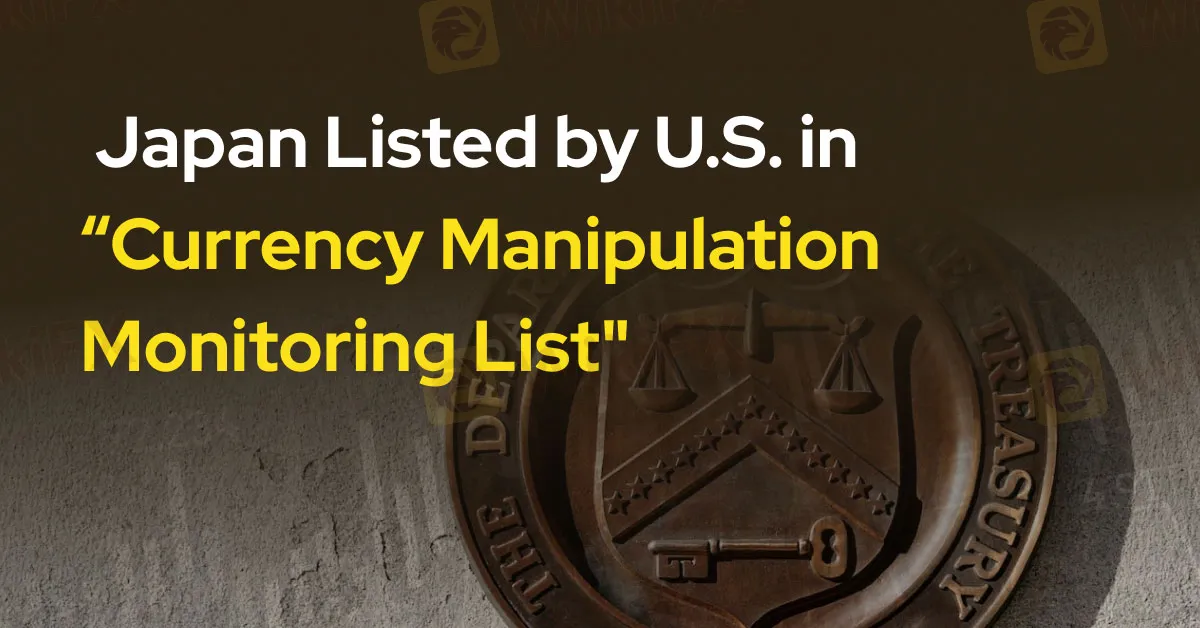简体中文
繁體中文
English
Pусский
日本語
ภาษาไทย
Tiếng Việt
Bahasa Indonesia
Español
हिन्दी
Filippiiniläinen
Français
Deutsch
Português
Türkçe
한국어
العربية
Japan Listed by U.S. in “Currency Manipulation Monitoring List"
Abstract:The U.S. Treasury Department said Thursday it has once again put Japan on a list of major trading partners that it monitors for potentially unfair foreign exchange practices. According to a June 21 report from Japan's Asahi Shimbun website, the U.S. Department of the Treasury announced on the 20th that Japan has once again been included in its "currency manipulation monitoring list."

The U.S. Treasury Department said Thursday it has once again put Japan on a list of major trading partners that it monitors for potentially unfair foreign exchange practices. According to a June 21 report from Japan's Asahi Shimbun website, the U.S. Department of the Treasury announced on the 20th that Japan has once again been included in its “currency manipulation monitoring list.” Analysts suggest that while the U.S. did not label Japan as a currency manipulator, placing it on the monitoring list serves as a warning. The United States, being the world's largest current account deficit country, closely scrutinizes countries and regions that accumulate significant trade surpluses with the U.S., suspecting deliberate currency depreciation to boost exports.
The U.S. Congress submits a report every six months on major trading partners' currency policies, and Japan has re-entered the monitoring list after a year. In 2023, Japan's trade surplus with the U.S. surged, with its current account surplus exceeding 3% of GDP, meeting the criteria set by the U.S. Treasury for inclusion in the monitoring list. Other countries and regions on the list include Germany, Malaysia, Singapore, Vietnam, mainland China, and Taiwan.
Japanese Finance Minister Taro Aso, speaking at a press conference after a Cabinet meeting on the 21st, commented on Japan being monitored again, stating, “This conclusion is based on mechanical evaluations by the U.S. regarding indicators such as the current account surplus and trade surplus with the U.S., and does not imply that the U.S. believes Japan's currency policy is problematic.”
Simultaneously, regarding Japan's interventions earlier this year to prevent a historic depreciation of the yen, the U.S. Treasury noted in its report, “Japan regularly discloses the results of its interventions, ensuring transparency.” Treasury officials interviewed on the 20th also expressed their view that Japan's currency policy is not problematic, describing Japan's interventions as counteracting competitive devaluation.

Disclaimer:
The views in this article only represent the author's personal views, and do not constitute investment advice on this platform. This platform does not guarantee the accuracy, completeness and timeliness of the information in the article, and will not be liable for any loss caused by the use of or reliance on the information in the article.
Read more

Financial Educator “Spark Liang” Involved in an Investment Scam?!
A 54-year-old foreign woman lost her life savings of RM175,000 to an online investment scam that promised high returns within a short timeframe. The scam was orchestrated through a Facebook page named "Spark Liang."

The Hidden Checklist: Five Unconventional Steps to Vet Your Broker
Forex broker scams continue to evolve, employing new tactics to appear credible and mislead unsuspecting traders. Identifying these fraudulent schemes requires vigilance and strategies beyond the usual advice. Here are five effective methods to help traders assess the legitimacy of a forex broker and avoid potential pitfalls.

Doo Financial Obtains Licenses in BVI and Cayman Islands
Doo Financial, a subsidiary of Singapore-based Doo Group, has expanded its regulatory footprint by securing new offshore licenses from the British Virgin Islands Financial Services Commission (BVI FSC) and the Cayman Islands Monetary Authority (CIMA).

CFI’s New Initiative Aims to Promote Transparency in Trading
A new programme has been launched by CFI to address the growing need for transparency and awareness in online trading. Named “Trading Transparency+: Empowering Awareness and Clarity in Trading,” the initiative seeks to combat misinformation and equip individuals with resources to evaluate whether trading aligns with their financial goals and circumstances.
WikiFX Broker
Latest News
AIMS Broker Review
The Hidden Checklist: Five Unconventional Steps to Vet Your Broker
Russia to Fully Ban Crypto Mining in 10 Regions Starting January 1, 2025
YAMARKETS' Jingle Bells Christmas Offer!
Why is there so much exposure against PrimeX Capital?
Two Californians Indicted for $22 Million Crypto and NFT Fraud
WikiFX Review: Is Ultima Markets Legit?
Colorado Duo Accused of $8M Investment Fraud Scheme
MTrading’s 2025 "Welcome Bonus" is Here
Malaysia Pioneers Zakat Payments with Cryptocurrencies
Currency Calculator


